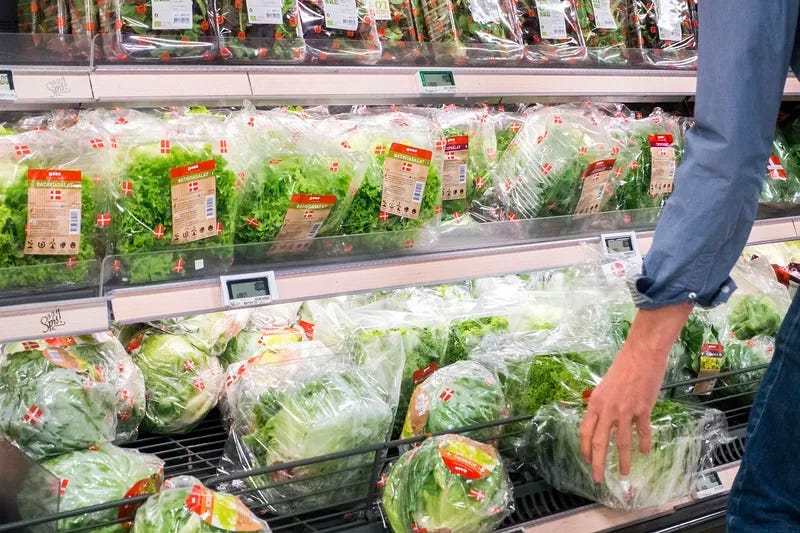A food crisis and an abortion crisis hit all at once
As abortion pills become easier to find at your local pharmacy, our most vulnerable communities will find food harder to come by at your local grocery store.
Crisis at our door: Chicago is about to be hit with a wave of food insecurity
By Pastor Chris Butler
On Feb. 28, 2 million people across the state of Illinois, about a million of them right here in Cook County, are going to lose access to food benefits that they have received for the past three years.
In April 2020, the Illinois Department of Human Services increased Supplemental Nutrition Assistance Program benefits by issuing "emergency allotments," an increase in funding per participant to help pay for food during the pandemic. But over the course of this month, SNAP recipients will receive their final emergency allotment before the increased benefit goes back to pre-pandemic levels in just 21 days.
If you’re tempted to believe that this means that things are “going back to the way they were” before the pandemic, let me rush to disabuse you of that notion. Things are about to become a lot worse than they were before the pandemic. In fact, we are very likely on a collision course with a full blown crisis of food insecurity.
Let me explain.
The emergency allotment of food help, like many other pandemic era programs, is ending well before the negative effects of the pandemic subside. SNAP benefits will retreat suddenly and fully to pre-pandemic levels. Experts estimate that households will see their benefits rolled back anywhere from $95 to $200 per person per month. But food costs, which have soared since 2020, are expected to continue to rise.
In 2020, the year SNAP recipients began receiving emergency allotments, food cost rose 3.9 percent. In 2021, the cost of food rose another 6.3 percent. Food inflation soared in 2022 when the cost of food jumped 10.4 percent higher. A December analysis projected that food cost will continue to rise in 2023, going up another 7.1 percent. All told, just as families are seeing their SNAP fall back to 2019 levels, they are facing price tags in the grocery store a whopping 28 percent higher than they were at that time.
On its own, this reality would be tough for Chicagoland families to face. But an escalating war in Ukraine, wages that consistently fail to keep up with overall inflation, and a slight-but-powerful Republican majority in the House of Representatives looking to extract their pound of flesh by forcing cuts to domestic programs all threaten to compound the problem.
Letters have gone out to SNAP recipients notifying them of the cuts to their monthly benefits. But there is some doubt in the advocacy community that enough has been to inform families of the impending rollback. I am also concerned that not enough has been done to rally the supplemental anti-hunger infrastructure for the very real challenges that lie ahead. Not the least of those institutions that have yet to be fully informed of what is coming, is the church. Nearly half of all churches have their own food program or support another one in the community. And nearly a quarter of Americans report having turned to a church-run food organization for help in their lifetime.
It goes without saying that the church in Chicago will rally to this moment as the reality of drastically increasing food insecurity sets in across the city. But more should be done over the next few weeks to get the word out and to help the church prepare.
As churches respond to the needs of the people in our congregations and communities, we’d do well to keep in mind that our charity alone won’t tackle the problem. Mercy ministries like food pantries do a tremendous amount to help fight food insecurity. But the call of scripture in Micah 6:8 is not only to “show mercy”, but also to “seek justice”. The two are often bound together in our community service and civic engagement.
A clear and recent example of this justice seeking is seen in the work of a group of Chicagoland churches that organized an effort called “Chicago Delivers” to help SNAP recipients cover the cost of groceries delivered to their home during the Covi-19 pandemic when social distancing was a life-saving mitigation (mercy ministry). It came to light early in the work that EBT cards, the card used to pay electronically with SNAP benefits, were not accepted on most of the online grocery shopping platforms. Those Chicago churches joined their voices with other advocates and saw Department of Agriculture rules changed to allow SNAP beneficiaries to shop online (justice ministry).
This crisis, while not in the headlines, is at our door. We, as the church, must begin to pray and to prepare.
The Round Up
Here are the stories that caught our eyes this week and what they mean for the weeks ahead.
Utility shutoffs for nonpayment soar across Illinois and the Chicago area
Chicago-area electricity and gas suppliers have the dubious distinction of cutting off more customers for nonpayment than most other utility companies, according to a recent report that calls the action a sign of “utility corruption” in Illinois.
The report singles out ComEd and Nicor Gas as extreme examples. ComEd canceled service for 225,827 accounts through October of last year, up 27 percent from the from that same period in 2021. Nicor Gas, which serves most Chicago suburbs, stopped service to 24,022 customers, up nearly 38 percent from 2021. Peoples Gas, the Chicago provider, increased shutoffs by 14.7 percent.
The authors of the report, called “Powerless in the United States,” are with the Energy and Policy Institute, the Center for Biological Diversity and BailoutWatch.
Local officials look to Illinois statehouse for pension relief
Chicago public officials have urged Illinois state government to address pension deficits. The city owes nearly $34 billion in unfunded pension liabilities for public safety workers like police, firefighters and other city positions.
At the City Club of Chicago last week, Chicago Mayor Lori Lightfoot said the city has paid $1.4 billion to the pension system during her four years as mayor.
The city budget includes $242 million in taxpayer funding for payments into the city's pension system.
Chicago elections have been nonpartisan since 1999, but Mayor Lori Lightfoot has tried to paint one of her biggest rivals — Paul Vallas — as a Republican, in an attempt to edge him out in her re-election bid.
For weeks, Lightfoot has described Vallas as a Republican in all but name. In an email to supporters, she wrote Vallas “has so strongly aligned himself with Republican views that he can’t even be considered a moderate Democrat.”
Vallas is a Democrat, and served the last Chicago mayor who officially ran as a Democrat — Mayor Richard M. Daley — in a number of roles, including as Chicago Public Schools CEO and budget director.
He also ran for the Democratic nomination for governor in 2002 and for lieutenant governor in 2014. Vallas, who is registered as a Democrat with elections officials, lost both races.
Lightfoot blasted Vallas as insufficiently supportive of abortion rights in a digital spot released Thursday because he did not tweet about his opposition to the U.S. Supreme Court's decision to overturn the federal right to an abortion in June.
During debates, Lightfoot has largely ignored the other conservative candidate in the race, businessman and philanthropist Willie Wilson.
Wilson says he is neither a member of the Democratic Party nor the Republican Party, though he ran as a Democrat for president in 2016. In that year’s general election, Wilson voted for Republican nominee Donald Trump.
Newsclips
What grocers can learn from Whole Foods’ controversial exit from a Chicago neighborhood
Chicago offering $11 million in grants for local nonprofit arts organizations
An R. Kelly victim says Chicago prosecutor made a mistake in dropping sex abuse case
‘So beautiful’: Century-old images shows glimpse into Chicago’s ‘Great Migration’ role
ComEd electric rate hike request worries consumers whose utilities costs are already rising
Bronzeville’s Obsidian Collection nears finish line as it goes for city council approval
Mayoral race highlights
Vallas proposes ‘second Burnham plan’ to rebuild neighborhoods, reverse population loss
Mayoral candidates agree public safety is top priority, mute attacks on one another at Crain's forum
Ald. Tom Tunney backs Paul Vallas for mayor
Pharmacy chains become front line in nationwide abortion fight
As abortion pills head to a pharmacy near you, pro-life activists step up direct action campaigns against the abortion industrial complex
By Mike Vick
This Saturday, February 4, more than 90 Walgreens, CVS and Rite-Aid locations, among them at least six Chicagoland stores, will become a new front in the fight against abortion, as the Progressive Anti-Abortion Uprising launches its nationwide “Stop Abortion Rx” campaign.
Walgreens and CVS announced plans in early January to offer mifepristone. Rite Aid followed suit in late January.
The announcements came after the FDA relaxed rules that previously required the abortion pill to be dispensed only at an authorized clinic or through certain specialty mail-order pharmacies.
The FDA has approved the drug to be administered in the first 10 weeks of pregnancy. It acts to block progesterone. After taking mifepristone, a second drug, administered later, induces contractions.
Without the second drug, as many as half of all pregnancies may continue, and mifepristone can result in birth defects if it does not kill the unborn child.
With medical abortions accounting for more than half of all abortions performed in the country, the FDA’s new rules would effectively turn the pharmacies, with thousands of locations nationwide, into abortion mills.
PAAU activists have urged pro-life Americans to:
Protest outside their local CVS, Walgreens or Rite Aid pharmacy.
Post to social media with the hashtag #StopAbortionRx to raise awareness.
Call their local pharmacy and demand they cut ties with the abortion industry.
Boycott CVS, Walgreens and Rite Aid immediately until they stop taking steps to sell abortion drugs.
Even in states where local laws have restricted abortion, the boycott can put pressure on the companies out of fear of losing brand loyalty in pro-life parts of America.
Yesterday, a group of 20 attorneys general in pro-life states warned the pharmacy chains that they could face legal action if they begin mailing and distributing abortion pills.
A dozen pro-life organizations, among them Rehumanize International, Live Action and Democrats for Life of America, have partnered with PAAU to pressure the pharmacy chains to walk back their plans to offer the abortion pills.
Students for Life of America will hold a follow-on protest on Feb. 14 at Walgreens’ national headquarters in Deerfield, Illinois.
I plan to join activists at PAAU’s Chicago protest Saturday and at the SFLA Deerfield protest on Valentine’s Day. I hope to see you out there.
To find a local protest and to download resources, check out PAAU’s Stop Abortion Rx website.
Do you have ideas for future Civic Update stories or want to contribute a story yourself? Email our editor by clicking the button below!












Good analysis, as usual!